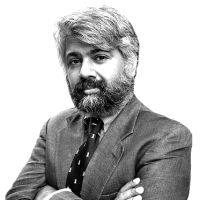
Here’s an exclamation I get from many non-Wall Streeters with whom I’ve talked about the recent Securities and Exchange Commission complaint against Goldman Sachs: “Can Goldman really do that sort of thing?” By which they mean to ask—to borrow an analogy from Frank Partnoy, a professor at the University of San Diego—whether Goldman really had no obligation to tell the gingerbread boys about the fox.
It would be hard to find a decent human being who would disagree with the view that Goldman’s methods were morally questionable. And it is here, in the interstices between the law and morality, that the pressure for reform starts to build up irresistibly.
The gingerbread boys were Goldman clients, institutional investors who bought collateralized debt obligations, or CDOs (pronounced “seedy owes”); and the fox, of course, was hedge-fund manager John Paulson, a short seller who had helped select the mortgages in the product, mortgages picked precisely because he thought they would go under. The nub of the legal case against Goldman is whether withholding the truth about a vulpine presence from the gingerbread boys was fraud. Goldman contends, robustly, that it was not; the SEC, equally adamant, asserts that it was.
• Tina Brown: Ghouls of Wall Street • Gregory Zuckerman: Inside Paulson’s Deal with Goldman Roger Martin: What Goldman’s Brass Knew This matter will be resolved in the courts one way or another, assuming Goldman does not settle. But as with so much that is wrong—or, just as damning, appears to be wrong—with Wall Street, the questions raised are not purely legal ones. Even allowing for an element of pre-election grandstanding, Gordon Brown, the British prime minister, was spot-on when he attacked the “moral bankruptcy” of Goldman Sachs on Sunday.
It has been argued—and argued, sometimes, too glibly—that the purchasers of the CDOs were sophisticated investors; in other words, that they were big players, not widows and orphans, and so deserve neither our sympathy nor our protection. But a sophisticated investor is not an omniscient one, and an investor’s sophistication is, inevitably, determined by the information he has—or should have—after suitably diligent research. But what if information, material information, is occluded, or obscured in such a manner as to lie beyond the reach of an investor’s research? The key question, then, is: Would the investors have bought the product if they’d known that Paulson had put it together, and that he was betting, as was his custom, that the mortgage market would go up in smoke? For only with that knowledge would they have had enough information to make an informed—and, no doubt, sophisticated—decision.
(There’s another angle worth pondering, one that arose in a conversation I had with Michael Thomas, a former partner at Lehman Brothers and the author of Love & Money: No matter how sophisticated the investors were, the deeper the original mortgage paper was immersed in the schist of complication, the more impossible it was to value the security—which led to a dependence on the triple-A ratings assigned to the top CDO tranches by Moody’s, etc. Historically, the rating agencies have defended their ratings as mere expressions of opinion entitled to free-speech protection. But if the agencies have reason to believe that their opinions might be wrong or even reckless, and that they might be relied upon as a key element in the perpetration of a fraud, should First Amendment protection apply?)
That the SEC insists there was illegality in the nondisclosure, and Goldman insists there wasn’t, does suggest that the law is not in a perfectly resolved state. Yet the morality of the matter betrays no ambiguity: It would be hard to find a decent human being who would disagree with the view that Goldman’s methods were morally questionable. And it is here, in the interstices between the law and morality, that the pressure for reform starts to build up irresistibly.
Even if it were able to stave off defeat in the courts, Goldman Sachs will not be able to do business in quite this manner again. Public opinion will not permit it. There is danger that the law might become a mere handmaiden of morality, especially when morality takes on a populist tinge, and our legislators must guard against overreaction. But in cases like Goldman’s, where there is a gulf so great between the formal rules and a broader sense of what is right, morality tends to become irrefutable.
This is especially true when those clamoring for change—and doing so under a moral standard—are not just those sections of society that are reflexively skeptical of markets and capitalism. In truth, it is those of us who value markets, and for whom our society would be inconceivable without capitalism, who have the greatest moral stake in an overhaul of Wall Street’s ways.
Tunku Varadarajan is a national affairs correspondent and writer at large for The Daily Beast. He is also a research fellow at Stanford’s Hoover Institution and a professor at NYU’s Stern Business School. He is a former assistant managing editor at The Wall Street Journal. (Follow him on Twitter here.)




